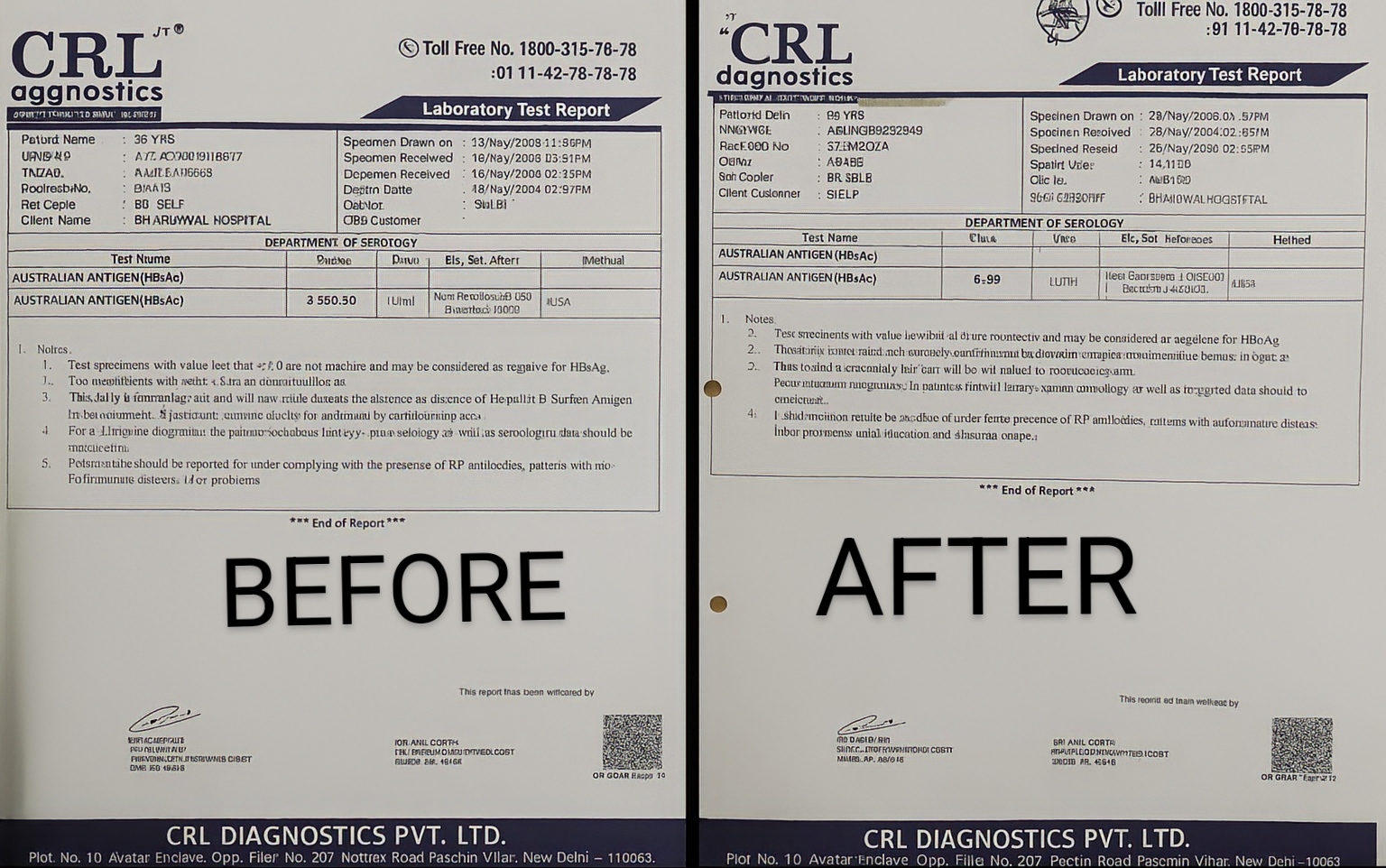Ayurvedic Management of Hepatitis B Case Study
Explore the successful ayurvedic management of a 38-year-old female patient with chronic hepatitis B. This case study highlights the reduction of HBV viral load and symptom resolution through polyherbal formulations over six months, suggesting the potential of Ayurveda in treating hepatitis B.
Dr. Arun Singh, Dr. Chandan Sah
8/28/20252 min read


Introduction
Hepatitis B is a viral infection primarily affecting the liver and transmitted through blood and bodily fluids. The presence of HBsAg (Hepatitis B surface antigen) for more than six months is indicative of chronic HBV infection, which can progress to liver cirrhosis or hepatocellular carcinoma. Modern medicine primarily manages HBV through antiviral drugs, which may have side effects and long-term dependency.
Ayurveda, the traditional system of medicine practiced in India, describes liver disorders under Kamala, Yakrit Roga, and related conditions. This system offers a holistic approach, emphasizing Dosha balance and rejuvenation. This case highlights the effect of Ayurvedic therapy in reducing viral load and alleviating symptoms in a confirmed case of chronic Hepatitis B.
Case Presentation
Patient Information:
Age/Sex: 38-year-old female
Location: Bhardwaj Hospital, Varanasi
Date of Diagnosis: November 2024
Diagnosis: HBsAg positive with HBV DNA viral load of 2568.30 IU/mL
Chief Complaints:
Generalized weakness
Persistent fatigue
Loss of appetite
Occasional nausea
No history of jaundice, haemetemesis, malena, ascites, or other hepatic complications.
Investigations:
HBV DNA (Nov 2024): 2568.30 IU/mL
HBsAg (Rapid Kit): Positive
Other parameters: Within normal range
Therapeutic Intervention
Treatment Protocol:
The following Ayurvedic medications were administered twice daily for six months:
Ayurzole (Sutshekhar Ras plus) – A proprietary herbal formulation aimed at hepatic detoxification and immune modulation.Classical preparation with deepana and pachana properties, useful in Agnimandya and Amlapitta.
Arogyavardhini Vati – A classical herbo-mineral formulation commonly used in liver disorders.
Phaltrikadi Ghan Vati – A herbal extract tablet known for hepatoprotective and immunomodulatory effects.
Liv 52 HB – A polyherbal proprietary medicine with clinical evidence for its hepatoprotective effects in viral hepatitis.
Diet and Lifestyle Advice:
Light, easily digestible diet (Laghu Aahar)
Avoidance of oily, spicy, and heavy foods
Daily mild physical activity
Stress-reduction through breathing practices (Pranayama)
Follow-Up and Outcome
After six months of continuous Ayurvedic treatment:
Symptoms: Completely resolved
Appetite: Normalized
Energy Levels: Improved significantly
HBV DNA (May 2025): Reduced to 6.99 IU/mL
HBsAg (Rapid Kit): Still Positive
Discussion
The patient showed significant clinical and virological improvement under Ayurvedic management. While HBsAg persistence suggests a continued carrier state, the substantial reduction in viral load and resolution of clinical symptoms indicate improved liver function and viral suppression.
From an Ayurvedic perspective, this condition aligns with Yakrit Vikara and Agni Dushti. The medications used targeted liver detoxification, Agni deepana, and Rakta shuddhi, while also providing hepatoprotective and rejuvenative (Rasayana) effects. Arogyavardhini Vati and Liv 52 HB, in particular, have demonstrated hepatoprotective action in previous studies.
The outcome supports the use of Ayurvedic formulations in early or moderate stages of HBV infection and warrants further clinical studies and trials.
Conclusion
This single-case study demonstrates that Ayurvedic therapy may contribute to significant improvement in Hepatitis B viral load and symptom resolution without adverse effects. While HBsAg positivity persists, the overall prognosis appears favorable. Larger cohort studies are required to further validate these findings and establish standard protocols for Ayurvedic HBV management.
Patient Consent
Informed written consent was obtained from the patient for the publication of this case report and accompanying data, ensuring privacy and confidentiality.
Conflict of Interest
None declared.
Funding
No external funding was received for this study.
